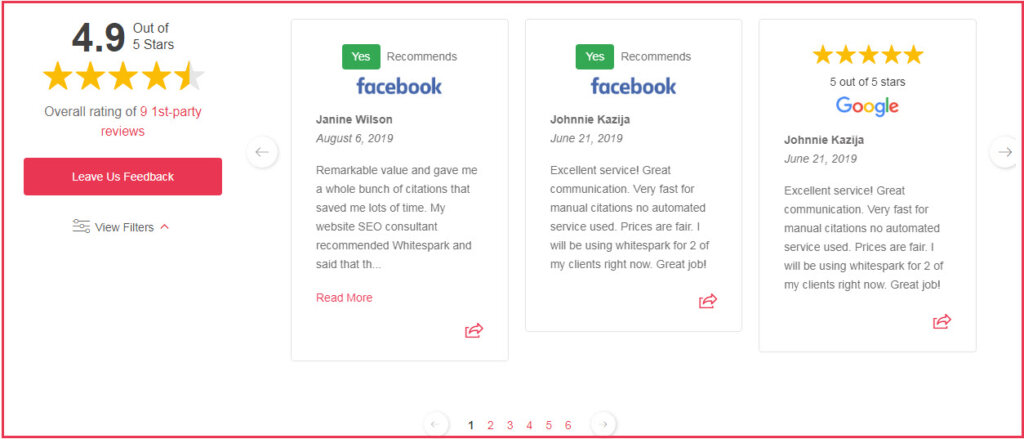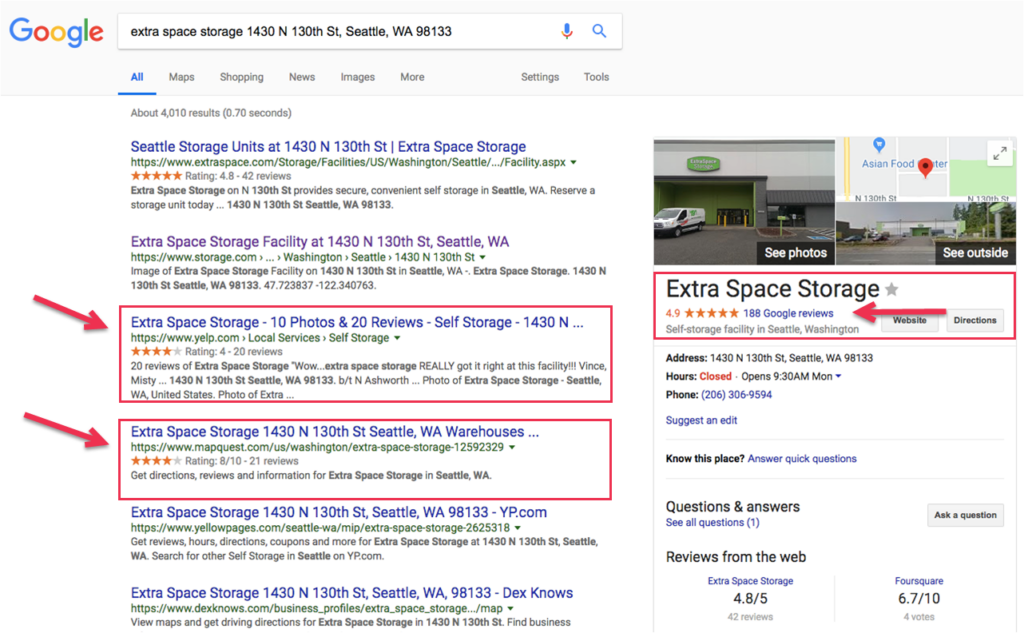🤓 The 2026 Local Search Ranking Factors are here!! Check out the report!
🤓 The 2026 Local Search Ranking Factors are here!! Check out the report!


On September 16th Google announced that they are going to be “making review rich results more helpful” and ultimately more meaningful by changing how they display review rich results.
Example of rich snippet results with review schema:

“Self-serving reviews aren’t allowed for LocalBusiness and Organization
Reviews that can be perceived as “self-serving” aren’t in the best interest of users. We call reviews “self-serving” when a review about entity A is placed on the website of entity A – either directly in their markup or via an embedded 3rd party widget. That’s why, with this change, we’re not going to display review rich results anymore for the schema types LocalBusiness and Organization (and their subtypes) in cases when the entity being reviewed controls the reviews themselves.”
Google will no longer show review stars in search results for testimonials (1st-party reviews) displayed on a business website or 3rd-party reviews embedded using a widget or code. Review stars shown in search going forward will only be informed by 3rd-party review sites (Yelp, Google, TripAdvisor, etc).

While your business can no longer use Review and AggregateReview markup to trigger rich results, Google is still allowing for other schema types, so be sure to review their article and follow their guidelines.
Google is removing the perks of using this markup because it is easy for any business to manipulate by creating fake review content and because they have complete control of the reviews they choose to share publicly. Since there is no way to “police” whether testimonials (1st-party reviews) are authentic on a business’s website, it’s easier to remove the perk of rich results.
While those shiny gold stars in search results have been known to help increase user click-through-rates (CTR) to your website, the worst that will happen is that you will see a slight decrease in CTR to your site. But, this change impacts ALL local businesses, and thus it should be felt equally.
You can still share testimonials (1st-party reviews or as Google labels them – “self-serving reviews”) and 3rd-party reviews on your website, and you will not get a manual action, penalty, or be negatively impacted by doing this, and you can also leave your current schema in place. Again, just make sure that whatever structured data you are using on your website follows Google’s guidelines.
It started on September 16, 2019 and Google has noted that they are rolling out this change slowly. It will be a gradual process and you may still see results with review stars where they shouldn’t be, but we expect that they will eventually all disappear.
Keep moving forward as you originally planned. This update should not impact how you gather your reviews, showcase reviews on your site, encourage 3rd-party reviews (especially on Google and other industry sites), and understand your customer experience.
This change only impacts the Reputation Builder in that now the schema that was built in to our Review Widget will no longer trigger those review star ratings in search results. The integrity of the tool and the value remain the same.

Testimonials (1st-party reviews) have long benefited businesses, long before review schema and rich snippets. They are incredibly valuable to your business for many reasons:
#1. When you request direct feedback from clients, you are more likely to receive unbiased feedback from customers in the form of a testimonial/1st-party reviews, than you are to acquire 3rd-party reviews.
#2. Incorporating reviews on your website allows you to build out your product/service/location pages with fresh, unique content, that is packed with keywords; which can help with the ability for these pages to rank in search. Utilizing reviews on landing pages can be notably beneficial for businesses that struggle with content creation.
#3. Adding social proof of customer experience in the form of testimonials (1st-party reviews) on your website helps establish trust, and convert searchers into customers.
#4. The feedback that you collect from customers via reviews gives you rich data to perform strategic analysis including keyword research, customer sentiment, and identifying customer experience trends to inform opportunities for continued improvement of your business
Now, we did say keep moving forward with your current online review strategy, but with one caveat, if you are not presently targeting and prioritizing 3rd-party review sites that trigger review rich snippets – like Google, TripAdvisor and so on, then you should adjust your acquisition strategy to promote these sites when you send your review ask email/text/message.

The loss of rich snippet results from review schema will not have a direct impact on rankings. First, there is no penalty for correctly using review schema markup on your site, this change is only announcing a loss of the stars in the search results. Second, when a manual action for incorrect usage of review schema has been issued, there is no negative impact on rankings, again it’s just a loss of the stars in results.
Example of review schema penalty:

We do know that reviews impact rankings overall (Local Ranking Factors Study – Review Signals for local pack/finder 15.44%, and organic 6.47%), and along with all the other reasons we mentioned above about how powerful reviews are, growing your reviews, using reviews to build your business and make it better are critical.
“Reviews are so much more than rankings. Reviews drive business.” Yes, preach! Stop thinking of Reviews as just a tactic. – @DarrenShaw_ at #MozCon
— Aaron Weiche (@AaronWeiche) July 11, 2018
Google uses reviews:
Beyond Google, reviews help businesses:
But hey! If you’re feeling really down about the loss of the stars, you could always improvise and make your own version:
Just had an idea – completely solved your lost star issue – BOOM #localu pic.twitter.com/3bOsTPwRU0
— Carrie Hill 🗺️📌 (@CarrieHill) September 19, 2019
Whitespark provides powerful software and expert services to help businesses and agencies drive more leads through local search.
Founded in 2005 in Edmonton, Alberta, Canada, we initially offered web design and SEO services to local businesses. While we still work closely with many clients locally, we have successfully grown over the past 20 years to support over 100,000 enterprises, agencies, and small businesses globally with our cutting-edge software and services.